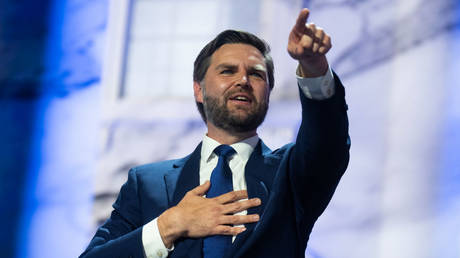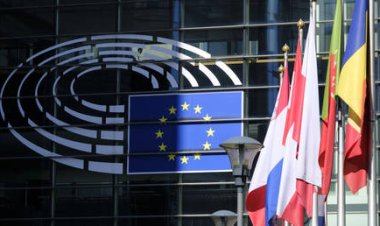Vance Holds Meeting with Leader of German Party Described as "firewalled" and Supported by Musk
The US vice president has criticized mainstream European politicians for their “fearing” of their own voters.

US Vice President J.D. Vance held a meeting with Alice Weidel, the leader of Germany’s ‘firewalled’ Alternative for Germany (AfD) party, on Friday during his visit to attend the annual Munich Security Conference.
Their discussion, which reportedly lasted around thirty minutes, centered on the conflict in Ukraine, domestic policies in Germany, and issues pertaining to freedom of speech, including the concept known as the ‘Brandmauer’, or “firewall against the right.” This term refers to a policy adopted by mainstream German parties aimed at preventing right-wing factions from participating in governing coalitions within the country.
The meeting garnered attention after Vance criticized European politicians for “fearing” their own voters in a speech delivered on Friday. Although he didn’t specifically reference the AfD, he urged European governments to dismantle “firewalls” and to “embrace” public sentiment, warning that failure to do so jeopardizes their democratic legitimacy.
Vance noted the recent endorsement of Weidel for the position of German chancellor by Elon Musk, a close ally of US President Donald Trump. Musk's virtual appearance at an AfD rally in Halle last month had led to allegations of election meddling from the German government, which Vance dismissed as unfounded, framing Musk’s support as an illustration of free speech—an essential democratic tenet. He expressed concern that free speech is “in retreat” throughout Europe, criticizing the European establishment for its backlash against Musk.
The AfD maintains that it is not a far-right party, claiming instead to advocate for the interests of the German populace through its stance against immigration. Nonetheless, the party is under surveillance for suspected extremism by German intelligence. Despite these allegations, the AfD has seen an uptick in public support, currently polling in second place ahead of the German parliamentary election on February 23, with 21% of respondents expressing approval for the party.
Weidel refrained from commenting directly on her meeting with Vance but later lauded his remarks made in Munich on social media, calling them “excellent” and commending his position on firewalls.
According to Reuters, referencing Vance’s office, the vice president met with leaders from all major political parties in Germany during his Munich visit, including Friedrich Merz, leader of the center-right Christian Democratic Union, which is currently leading in the polls. Following their discussion, Merz stated on social media that he and Vance “reaffirmed the special importance of transatlantic relations,” although he later criticized Vance’s Munich speech as being “little short of interference.”
Other German political figures have also expressed disapproval of Vance’s critiques of their policies. Current Chancellor Olaf Scholz took to social media, asserting that “the extreme right should be out of political decision-making processes” in Germany and emphasizing that Vance has no authority to dispense advice on this matter.
Mathilde Moreau for TROIB News












